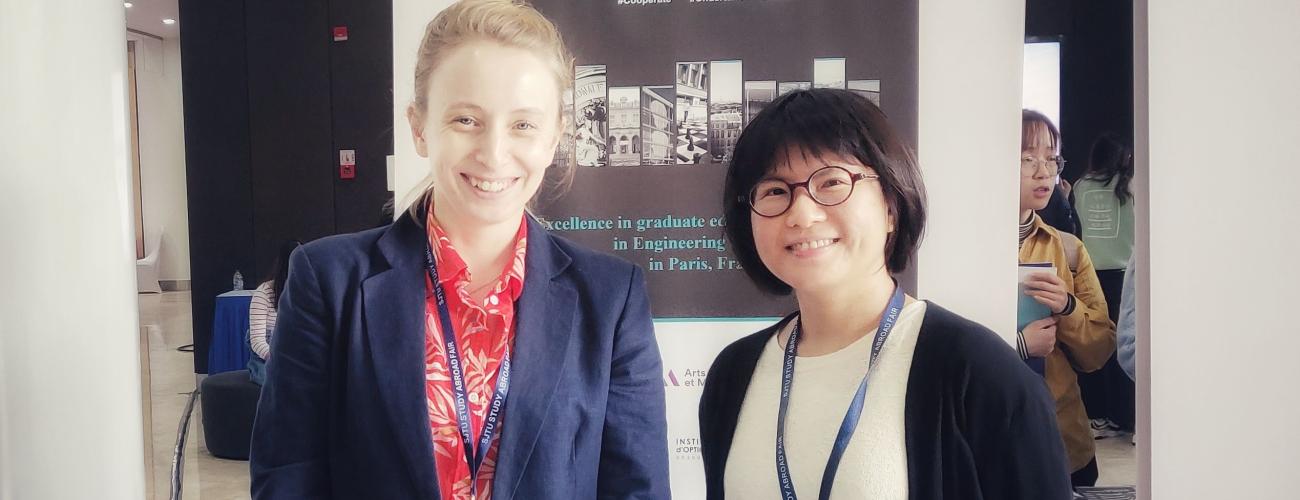
ParisTech Chine Laura VILLETTE and Yuan Yuan SHEN
ParisTech China
Work in times of pandemic : Laura Villette, ParisTech director in China
Laura Villette took her post in Shanghai in September 2019. Just arrived, she had to manage the selection of candidates willing to study engineering at ParisTech schools and PhD candidates. She used the confinement period to strengthen ties with ParisTech’s partners in China, and follow up with the selected candidates.
"The pandemic obviously impacted our work: since the end of January 2020, and the closure of university campuses, access to our office (located within Tongji University, in Shanghai), has been restricted. My colleague, Yuan Yuan Shen, can now go there, after obtaining an authorization, but I still can’t.
Higher education has been, and remains, one of the sectors most affected by the crisis. ParisTech is no exception. We recruit Chinese students every year for our engineering degrees (through an international admission program, known as the 9 + 9 program in China), as well as PhD candidates (through the ParisTech - CSC PhD program). To do so, we organize an annual promotion mission in the spring: the directors of International Relations from our schools come to China to present the 9+9 program and their schools, meet with our partner universities.
This year recruitments for the 9+9 program were finalized in January 2020 (for students due to start their degrees in France in September 2020). The recruitment of PhD candidates was underway during the confinement in China. For the former, it was important to maintain regular contact, to ensure that despite the many uncertainties about the world situation, their motivation to go to France was not impacted, that they could continue to learn French despite the shutdown of the Alliances Françaises, and finally, that the procedures to obtain a CSC scholarship (China Scholarship Council) remained fluid. Only very few students withdrew so far, but we must now be reassuring about the situation in France, about the possibility of welcoming them in September, or failing that, to guarantee them educational continuity at the start of the 2020 academic year. We are working on it.
The PhD candidates’ recruitment campaign suffered relatively little impact, most of the procedures being done online (interviews with supervisors, CSC grant applications). Our agreement with the CSC offers 30 doctoral scholarships each year: around forty applications have been submitted, confirming the attractiveness of this program.
The 2020 spring promotion mission was of course cancelled. We therefore reacted in March 2020 to compensate for this, by digitalizing the campaign, with video testimonials from Chinese students in France, videos presenting our schools, our engineering diplomas, etc. We now have new tools. We also participated in webinars organizing by Campus France China. We also organizing one ourselves on May 20, 2020. This webinar took place simultaneously in the countries where we recruit (Argentina, Brazil, China, Colombia, Russia). The COVID-19 pandemic has enabled us to accelerate the digitalization of our communication tools, to explore new ways of reaching students and alumni. We will be able to perpetuate some of these tools in the future.
Somewhat paradoxically, the crisis has brought us closer to our Chinese partners. In February the ParisTech China Office sent messages of support to the directors of international relations at our partner universities. Christian Lerminiaux, President of ParisTech, followed up on this by writing letters of support to the presidents of the various universities. And then when the crisis reached France, the roles were reversed and our Chinese partners reached out to us with words of encouragement and support. These exchanges enabled us to establish or renew ties, and sometimes even to initiate discussions on new agreements.
Our alumni associations also reacted fast, through various initiatives (support for the Red Cross, purchase of medical equipment for France). Long before the French Government took action, ParisTech also launched a fund to support students whose financial situation was damaged during the crisis. This has allowed us to help more than 15 students so far.
Today, China is slowly emerging from the crisis. But it is of course too early to say the crisis is over: how can we encourage human exchanges when most of the borders are still closed, and there is uncertainty about short- and medium-term conditions? Our reflections and work today relate to these questions."
Where to find ParisTech China:
- WeChat (scan the QR code)


